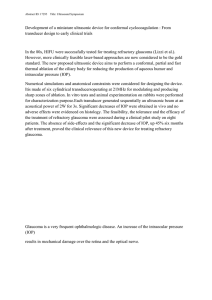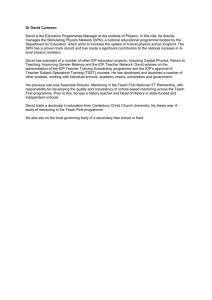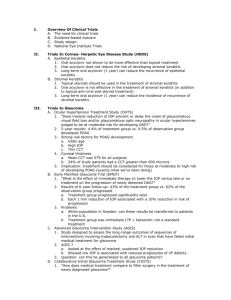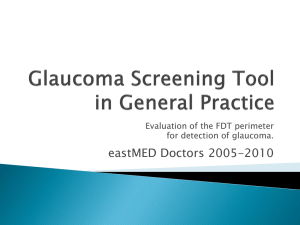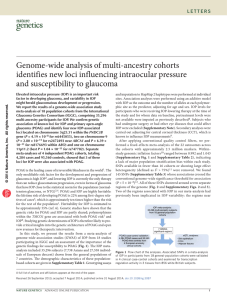Development of a miniature ultrasonic device for conformal cyclocoagulation : From transducer design to early clinical trials
advertisement
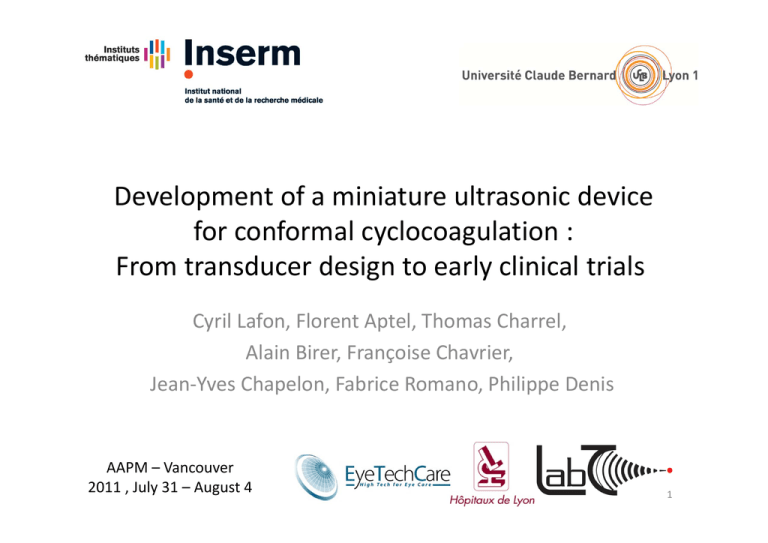
Development of a miniature ultrasonic device for conformal cyclocoagulation : From transducer design to early clinical trials Cyril Lafon, Florent Aptel, Thomas Charrel, Alain Birer, Françoise Chavrier, Jean‐Yves Chapelon, Fabrice Romano, Philippe Denis AAPM – Vancouver 2011 , July 31 – August 4 1 Glaucoma LENS CILIARY BODY 2 Aim of our study Achieve precise, fast cyclodestruction with a disposable ultrasonic device and without image guidance 1. Transducer design and characterization 2. In vivo experimentation in rabbits 3. First clinical trials 3 Design of the device ‐ Methods • Anatomical constraints (ciliary body, lens, cornea, retina) 4 Design of the device ‐ Methods • Numerical modeling (→ exposure conditions) – Rayleigh integral – Bio Heat Transfer Equation – Thermal Dose 2 W 3s ON 20s OFF 5 Design of the device ‐ Results Feature Value Piezo ceramic elements 6 (~70% of CB) Operating frequency 21 MHz Focal distance 10.2 mm Diameter of circular lesion 11.7, 12.2 or 12.7 mm Diameter of central hole 12.8 mm 6 Characterization of the device • Field maps to assess the effect of the coupling cone 12.6 mm ‐6dB ‐12dB 12.7mm Ø ‐20dB 7 Animal experimentation ‐ Methods • 18 rabbits, 6 (Gr 1), 5 (Gr 2) or 4 (Gr 3) activated sectors • IOP followed for 28 days after sonication, assessment of undesired effects • Exposure conditions: 21 MHz, 2 W for 3 s, 20s OFF 8 Animal experimentation ‐ Results • Sustained IOP reduction at D28 for Gr 1 • Damages very localized to the ciliary body (CB) 10 Damaged CB IOP (mm Hg) 5 0 ‐5 ‐10 ‐15 ‐20 D1 Blue, D28 Red ‐25 Gr 1 Gr1c Gr 2 Gr2c Gr 3 Gr3c Undamaged CB 9 Clinical trials ‐ Methods • Treatment under general anesthesia • Exposure condi ons: 21 MHz, 2 W, 3 s ON (1→4) and 4 s (5→12), 20 s OFF 10 Clinical trials – Inclusion criteria • Men or women aged of 18 years or older • Ability and willingness to return for scheduled visits • Diagnosis of refractory primary or secondary glaucoma with at least one previous incisional glaucoma surgery • Average baseline IOP of 21 mm Hg or more • Best corrected visual acuity less than 20/60 • Visual field defect with a minimum of one location in the paracentral region exhibiting repeatable abnormality at the p < 0.5% level in the study eye. 11 Clinical trials – Exclusion criteria • Mental impairment conflicting with informed consent or follow‐up • Current use of any investigational drug or device • Pregnancy • Concomitant systemic medications that can affect the IOP • Diagnosis of normal tension glaucoma • History of refractive surgery, retinal detachment or ocular tumor • Intraocular surgery or laser within the last month • Ocular infection in the past 2 weeks. 12 Clinical trials – Choice of device • Fit device and expected treatment zone over UBM images 11.7 12.2 12.7 13 Clinical trials ‐ Results • 12 patients (3 et 4 s) • No major side effects (Corneal ulcerations) • One failure → trabeculectomy • IOP↘ up to 45% ‐ stable UBM before treatment IOP % UBM after treatment Shrinkage & atrophy of the ciliary processes, no other damages 14 Conclusions • Design and test in vivo an ultrasonic device for easy, fast and conformal destruction of the CB • Perform very promising clinical trials with excellent tolerance and significant drop of IOP on patients with refractory glaucoma 15

